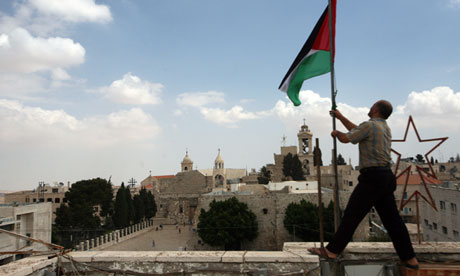No room at the inn – but Bethlehem's popularity is a boon for Palestinians
 Sunday, December 23, 2012 at 05:41PM
Sunday, December 23, 2012 at 05:41PM http://www.guardian.co.uk/world/2012/dec/21/bethlehem-popularity-boon-palestinians
More visitors and statehood recognition raises hopes for tourism industry in West Bank city, which is largely controlled by Israel
Harriet Sherwood 21 December The Guardian

Ever since Mary and Joseph were turned away, the ancient biblical town of Bethlehem has had a bad press over its room availability. And this year is likely to be no better as it celebrates its first Christmas after the recognition of Palestine as a state and at the end of a record year in tourism, making it likely that there will once more be no room at the inn.
Tens of thousands of pilgrims and tourists are expected to visit the birthplace of Jesus over Christmas. All of the West Bank city's 3,700 hotel rooms are likely to be filled, with thousands more visitors making day trips from nearby Jerusalem.
This year has seen a 20% growth in the numbers of visitors to Bethlehem compared with the previous year, and officials hope for a further rise in tourism to Palestine next year. The biggest number of tourists – more than a quarter – come from Russia.
Officials are heartened by the increasing number of visitors who are opting to stay in hotels in Bethlehem rather than just making the trip from Jerusalem. The number of overnight stays is expected to reach 1.5m by the end of this year.
Hotel rates in Bethlehem are about half the price of the equivalent accommodation in Jerusalem, which is just six miles away.
But officials say the local tourist industry still faces huge hurdles as a result of Israel's continued occupation of the West Bank. Israel controls all entry to the West Bank. Tourists and pilgrims either have to fly into Ben Gurion airport in Tel Aviv or cross overland from neighbouring Jordan via borders controlled by Israel.
Palestinian tour buses are forbidden from entering Israel to collect visitors from the airport and they are not allowed to take groups to visit holy sites in Jerusalem or Galilee.
Tourists and pilgrims to Israel are usually brought to Bethlehem to visit the Church of the Nativity and other historic sites on short visits organised by Israeli tour operators.
Palestinian officials say such visitors rarely stay overnight or spend money in local restaurants and souvenir shops.
"Ninety percent of tourism to Bethlehem is controlled by Israel," said local tourism expert George Rishmawi. "Many tourists are warned against coming to the West Bank, and are afraid to cross the wall," he added, referring to the concrete barrier that separates Bethlehem from Jerusalem.
Since the wall was constructed around Bethlehem almost 10 years ago, local businesses have struggled in the face of restrictions on movement and access.
Farmers in the area have also seen much of their land taken over in the past four decades since the six-day war for the construction of the 20 settlements close to Bethlehem.
But tourism, one of the main economic sectors, has picked up over the past year. "Next year, we are expecting a further increase," said Samir Hazboun, the chairman of the Bethlehem Chamber of Commerce. "We are working on new markets, such as India and Latin America."
Officials hoped that the United Nations' implicit recognition of the state of Palestine and the inclusion of Bethlehem on the list of world heritage sites by the UN's cultural arm, Unesco, would further boost tourist numbers.
The city is planning to increase the number of hotel beds, offer improved packages and invest in marketing and promotion, said Hazboun.
"OK, we are living in a big prison, but we still hope that things will change."
Bethlehem is "a symbol of hope and peace" to the world, said Rishmawi. However, he added: "Hotels in Bethlehem will be full at Christmas, but we need families to come here all the year round, to walk in our streets and eat in our restaurants."
 APJP |
APJP |  Post a Comment |
Post a Comment |